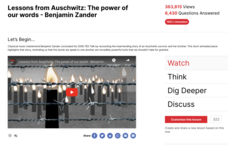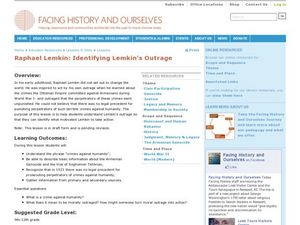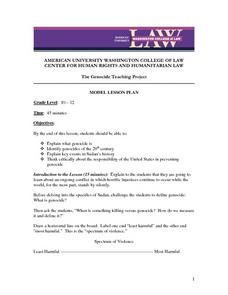Facing History and Ourselves
The Holocaust: Bystanders and Upstanders
Scholars analyze the role of bystanders during the Holocaust. The investigation explores the roles of the bystanders, upstanders, and rescuers with primary and secondary resources to determine actions taken—or not—and their implications...
Facing History and Ourselves
How Should We Remember?
We must remember the past in order to avoid its mistakes. Young historians analyze the importance of historical remembrance using primary and secondary documents, as well as video clips. They then study the creation of a World War II...
Equality and Human Rights Commission
Actions and Consequences
Even the smallest actions can produce big consequences! Explore the results of both good and bad actions through an engaging activity. Grouped pupils analyze scenarios to examine the physical and emotional outcomes of teasing, bullying,...
Partners Against Hate
Building Community and Combating Hate
Put a little love in your classroom! Help middle school scholars understand differences among people and build a sense of community within their school through 10 well-organized lessons. Each unique lesson incorporates writing,...
Curriculum Project
Hotel Rwanda: Comprehension and Discussion Activities for the Movie
Support your presentation of the film Hotel Rwanda with this collection of worksheets, which includes background information, vocabulary, summary of characters, and fill-in-the-blank worksheets for students to complete as they watch the...
University of Southern California
Deconstructing Genocide: The Ultimate Crime Against Humanity
There are eight stages of an atrocity known as genocide, and it's important to understand how they are represented so we can fight against it in the future. As young historians watch video clips of ten Jewish Holocaust survivors'...
TED-Ed
Lessons from Auschwitz: The Power of Our Words
Some words are best left unspoken. Words matter, according to Benjamin Zander, conductor, teacher, and lecturer. To illustrate his point, Zander recounts a story told to him by a survivor of Auschwitz. As a result of her experience this...
Speak Truth to Power
Elie Wiesel: Speaking Truth to Genocide to Power
Invite your learners to discover the efforts of Night author Elie Wiesel to promote awareness of genocide in the world. After watching and reading an interview of Elie Wiesel, high schoolers work to create a living Holocaust museum by...
Lesson Snips
Lessons from the Holocaust
Connect global examples of attempted genocide with a well-designed social studies lesson. It includes an excellent informational text with background information on the Holocaust, as well as worksheets, book report guidelines, and...
Curated OER
Promote Tolerance on International Holocaust Remembrance Day
Delve into the history of Auschwitz to educate this generation about the Holocaust, genocide, and tolerance.
Curated OER
Genocides of the 20th Century
Ninth graders research the causes of the major genocides of the 20th century. They participate in a jigsaw activity and complete a concept map of different genocides, watch and discuss excerpts from the movies "Hotel Rwanda," "The...
Curated OER
Darfur: Violence and the Media
Learners read an article on Darfur prior to class, discuss the conflict in Darfur, visit a series of websites, and complete a worksheet evaluating the reporting and sources used. They view films on genocide to decide if the Darfur...
Curated OER
Intolerance in American History
Examine the United States through the lens of intolerance using this 2-week unit plan, which includes details for 13 days of instruction. Scholars study examples of prejudiced behavior throughout history, discuss issues in groups,...
Curated OER
Teaching About Genocide
Teaching children of any age about genocide or The Holocaust can be difficult, as the content is sensitive and often emotional. This academic article was written by an educator and is intended to help you consider multiple aspects of...
Curated OER
What Concepts are being presented
World War II, WWII, the Holocaust, the Rise of the Nazi Empire, Concentration Camps, the effect on children. The first 9 slides are of images and scenes of WWII, Black and white photography Slides 10 to 20 show present day photos of...
Curated OER
Genocide in Africa
This slide show provides the images of maps, people, and locations related to the genocide occurring in Africa. One slide outlines details of major events concerning Rwandan Civil War and Darfur. The images could be used to accompany a...
Curated OER
Holocaust: Voice of the Children
A picture is worth a thousand words. A visual account of the Nazi Empire, past and present scenes of WWII Concentration Camps, and the children of the Holocaust are presented in this slide show. Image heavy and graphic in nature, this...
Curated OER
Nation Building
Ninth graders examine the role of the United States in nation building. In this World History activity, 9th graders evaluate the role of the United States in building nations in other parts of the world.
Facing History and Ourselves
Continuing Lemkin's Legacy: What Can We Do to Prevent and Stop Genocide?
Young scholars investigate genocide. In this contemporary history lesson, high schoolers research Darfur advocacy organizations and present plans of action to stop the injustice in Darfur.
Facing History and Ourselves
Raphael Lemkin: Identifying Lemkin's Outrage
Students examine World War I war crimes. In this world history lesson plan, students use primary and secondary sources to research Armenian genocide and the trial of Soghomon Tehlirin.
Curated OER
The Genocide Teaching Project
Students investigate what genocide is as well as places that it is found in the 20th century. They trace the history of genocide back to the events that occurred in Sudan's history. Brainstorming ways to prevent the ongoing conflicts and...
Curated OER
Genocide
Students research acts of genocide to become aware that acts of genocide have been ongoing throughout history, and continue today. Students create a presentation including a verbal description of the situation, a written summary and a...
Curated OER
Putting a Face to the Numbers
Students define the term genocide in there own terms and discuss reasons why genocide occurs. In groups, students research genocides throughout history. They compile historical accounts of genocide to be include in a class compilation...
Curated OER
Sudan -- Efforts to Avert Genocide in the Making
Students examine current events in Sudan and their efforts to prevent another genocide. They identify the roles of different humanitarian organizations in the area. They research the efforts to bring those accused of genocide to justice.

























